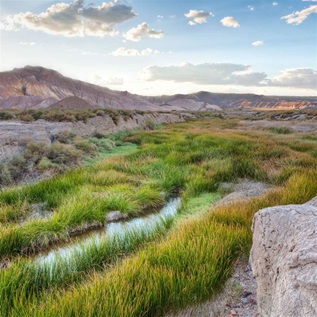Why New Hampshire Should Care About Western Mining
Odd as it may seem, an Eastern state like New Hampshire has a real stake in the Western mining law reform movement now under way in Washington, D.C. While mining is no longer a big industry in the Granite State, the price of long-outdated policies governing mining on public lands has been felt in New Hampshire and the rest of the country. New Hampshire -- and all states -- stand to benefit if genuine reforms clean up mining on public lands and protect taxpayers from a new legacy of mining problems.
It all started in 1872, when Ulysses S. Grant signed a law aimed at populating the West by opening up public lands to explorers seeking gold, silver and other valuable “hardrock” minerals. Pioneers could stake a claim, work the property and take outright ownership of public land for no more than $5 per acre. Unlike oil, gas and coal industries that have been compensating taxpayers for decades for resources taken from public lands, miners then -- and now -- pay no royalties to the treasury.
The mining industry also enjoys unfettered access to many Western public lands -- even when valuable fish and wildlife habitat is threatened or pristine landscapes marred. The federal government estimates hardrock mining has contaminated more than 40 percent of Western watersheds and handed all of us a cleanup bill that could total $50 billion or more.
In New Hampshire, we've seen up close and personal the mess that mining can leave behind. Decades ago, improperly cleaned up mines left the state a legacy of polluted waters and scarred landscapes. Toxic runoff and sedimentation fouled the Connecticut River, a result of copper mining from several Vermont mines that now are designated Superfund sites.
Just across our border, the Elizabeth Copper Mine, closed in 1958, “left behind 47 acres of tailings, heap leach piles, waste rock, two large open cuts, several ore processing buildings and almost a mile of underground workings,” according to the U.S. Environmental Protection Agency. Acid mine drainage still pollutes a tributary of the Connecticut River.
Past mistakes may soon be repeated. According to the nonprofit Environmental Working Group, our public lands are in the midst of a mining rush. From 2003 to mid-2007, there has been an 80 percent increase in new mining claims on Western lands, many of which lie within a stone's throw of the Grand Canyon, Yosemite National Park and other national treasures that belong to all of us.
With support from both New Hampshire representatives in Congress, the U.S. House passed an important bipartisan reform bill last year, which updated the Civil War-era statute and provided key protections for taxpayers and the environment. But the measure still faces a tough test in the Senate, where allies of the metals mining industry could weaken its environmental and taxpayer safeguards.
Our U.S. senators, Judd Gregg and John Sununu, can play an important role as leaders in protecting the environment and taxpayers from paying the steep price of future, costly mine clean-ups. Genuine reform should set a royalty for all metal mines on public lands — comparable to that paid by oil, gas and coal industries. The royalty should apply to both current and future mining operations and should be based on gross revenues, not a scheme that could allow for manipulation. It's not only a fair practice but one that could add precious new funds for cleanup and potentially reduce competition among many states, including ours, for scarce Superfund money.
Real reform also means protecting the national parks, monuments and forests that belong to all Americans. New rules must be established to keep our natural treasures from the harmful impact of mining so that they are preserved for future generations to enjoy.
New Hampshire -- like every other state -- has a stake in modernizing the nation's mining law. It's time for the Senate to pass genuine and fair reform.











